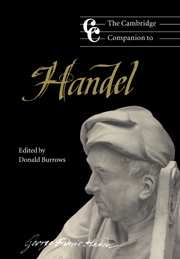Introduction
Published online by Cambridge University Press: 28 September 2011
Summary
Handel is at the same time one of the most accessible and one of the most elusive of the major creative figures in Western music. The ‘Hallelujah Chorus’, ‘Handel's Largo’, the Hornpipe from the Water Music and the opening of ‘Zadok the Priest’ are examples of pieces of his music that have had sufficient appeal to find their way into ‘popular’ consciousness at various times during the twentieth century. Moreover, Handel's broad, attractive musical style seems to present few problems for the listener: it is to be heard in the background in restaurants and aircraft cabins, the choice of company managements that wish at the same time to find a pleasingly neutral aural background and to flatter their clientele with allusions to ‘high’ culture. No one would begrudge Handel this place in the sun: indeed, most of us would prefer that, if the aural wallpaper is to be inevitable, it should be worth listening to. But of course there is a danger that the music will be taken for granted: it is heard so often that everyone ‘knows’ it: it is assumed that there is no more to be said, and even repeat performance borders on the superfluous for real musicians. Mozart's 40th symphony and Beethoven's Fifth suffer this same hazard, but perhaps the danger to Handel is more subtle: his style is in itself sometimes apparently so effortless as to discourage further investigation. Yet there is indeed more to be said, and more questions to be asked, about the context in which Handel’s style developed, about the novelty of his own mature style, about the compositional skill that lies behind the apparently effortless fluency, and behind his knack of setting up a mood or an emotional intensity with the simplest musical means.
- Type
- Chapter
- Information
- The Cambridge Companion to Handel , pp. 1 - 8Publisher: Cambridge University PressPrint publication year: 1997



